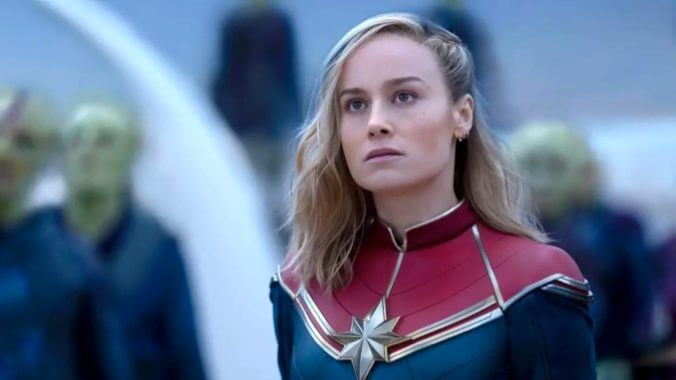Captain Marvel Is the MCU’s Gayest ‘Not Gay’ Superhero
I would love for Marvel to just confirm her sexuality already, but there is something special about Carol Danvers' ability to live within two worlds.
Brie Larson as Captain Marvel in The Marvels.Photo: Disney (Other) Entertainment Captain Marvel
Throughout its existence, the Marvel Cinematic Universe has showcased few middling, explicit attempts at LGBTQ representation. Ranging from Gay Joe Russo in Avengers: Endgame to Korg’s husband (who was essentially just Korg with a mustache) in Thor: Love and Thunder, a surface glance at the MCU reveals a lackluster track record of truly meaningful or sincere queer stories. However, across both Captain Marvel and The Marvels, the MCU has engaged in both thoughtful and impactful queer storytelling—even if it isn’t explicitly stated on screen.
In all but name, Brie Larson’s Carol Danvers, the mighty Captain Marvel, is queer. From her “friendship” with Maria to her self-imposed exile, Carol never says she’s gay, but to those who understand the implicit queer language present throughout her story, those deep connections and biting choices feel familiar and authentic to queer life.
In the titular film, we are introduced to Maria (Lashana Lynch) as Carol’s “best friend.” They live together, they work together, and they co-parent Maria’s daughter Monica (Akira Akbar) side by side. As Carol attempts to put the pieces of her life back together after the colonizing Kree stole her memories and used her as a super soldier to further their cause, we are treated to karaoke flashbacks and sweet family photos. These glimpses transcend the pretenses of “best friends” and “Aunt Carol.”
Of course, women can and should be allowed caring and deep friendships on screen, but the bond between Carol and Maria is different. In Captain Marvel’s 90s setting, Carol and Maria’s cohabitation skews closer to a quiet (but not secret) relationship, where they’re dedicated to spending their lives together in their shared home, just like queer icons throughout history have lived with lifelong roommates.
It’s this relationship between Maria and Carol that anchors the larger-than-life, ultra-powerful Captain Marvel to her humanity. Even in The Marvels, when Maria makes a haunting appearance in Carol’s memories, their interactions are defined by their shared love for their daughter and a very lesbian in-joke about cats.
Later in The Marvels, Carol finally reveals why she avoided returning to Earth in those 30 years: After Captain Marvel, she returned to Hala, the Kree’s home planet, and destroyed the Supreme Intelligence, the AI governing body responsible for the Kree’s continued colonization and Carol’s own kidnapping and brainwashing. However, the destruction of that body forced the Kree into a civil war, and earned Captain Marvel the nickname “The Annihilator.” She couldn’t fathom facing the child who once looked up to her as this disgraced version of herself—she believed she couldn’t come home until she fixed the Kree, fixed Hala, and finally put herself back together. The loneliness of Carol’s self-imposed exile and her unwavering self-loathing offers a heightened representation of a sometimes-lonely queer existence.
-

-

-

-

-

-

-

-

-

-

-

-

-

-

-

-

-

-

-

-

-

-

-

-

-

-

-

-

-

-

-

-

-

-

-

-

-

-

-

-








































